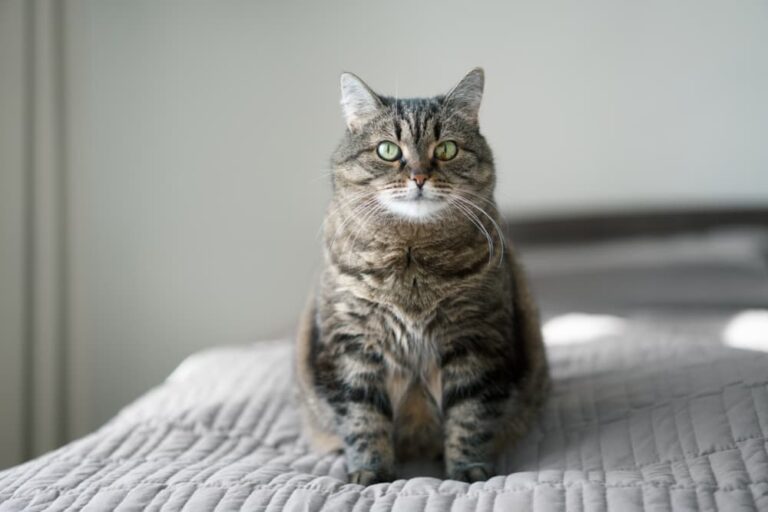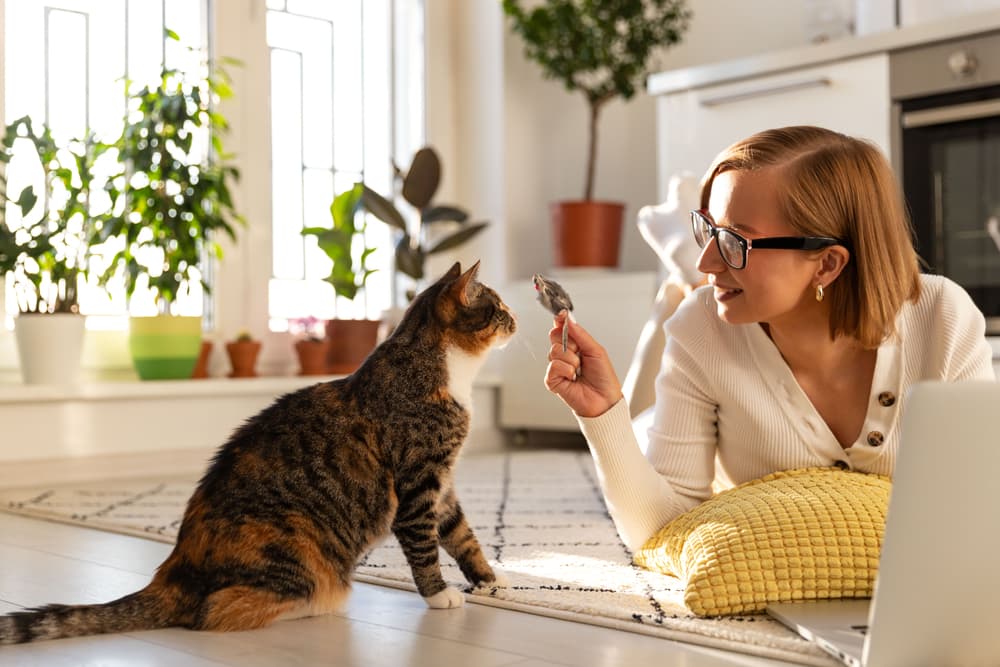6 Reasons Your Cat Can’t Lose Weight

Is Fluffy looking a little extra, well…fluffy? If your beloved cat has a little more to love these days, you’re not alone. Almost 60 percent of cats are overweight or obese, according to the latest data from the Association for Pet Obesity Prevention (APOP).
“Overweightness and obesity in cats are a huge problem,” says Jackie Parr, a veterinary nutritionist and Clinical Assistant Professor of Nutrition at the University of Georgia. “It has reached the point that we are calling it an epidemic.”
Even if you think your precious pet is a perfectly healthy weight, gradual weight gain in cats is easy to miss. Although a significant percentage of cats are not maintaining ideal feline figures, APOP found that 28 percent of cat owners only weigh their cats once a year. Paying closer attention to your cat’s weight now — whatever it is — can help you avoid health complications later on.
Overweight Cat: Understanding When a Cat is Considered Overweight

Just like people, cats come in all shapes and sizes, and the number on the scale isn’t the only factor in determining whether your cat is overweight. That’s why many veterinarians use a more qualitative approach called a body condition score.
Based on the amount of body fat the veterinarian can see and feel, they’ll assign a score ranging from one to nine. A body condition score of five means the cat is at their ideal weight, but a ranking between six and nine indicates that it’s time to help your cat slim down.
A low score isn’t necessarily a reason to panic, either. Some veterinarians use a five-point body condition scale, in which a score of three is just right. Be sure to ask which scale your veterinarian uses.
Parr recommends using a similar visual assessment to help you determine whether it’s time to start a feline fitness plan.
“Looking at your cat from above, you should see an hourglass figure,” says Parr. “There should be a taper behind the ribs where they have a little waist. If pet parents don’t see a waist on their cats, it’s a sign that they’re already starting to carry a little bit too much extra weight.”
If your cat needs to lose weight, your veterinarian can recommend strategies such as cutting back on calories, initiating an exercise plan, or testing for certain medical conditions to get the needle on the scale moving in the right direction.
We make it easy to track your pet’s weight using our FREE weight tracker. Sign up today!
6 Reasons Your Cat Can’t Lose Weight

Starting your cat on a veterinarian-approved weight loss program is essential to help reduce their risk of diabetes, ease (or prevent) joint pain, and help them live out their nine lives in good health.
If their weight isn’t going down, one of these six factors could be to blame.
Meal Time Is All The Time
Keeping the food bowl filled is a recipe for weight gain. Cats are more likely to nibble on too much kibble when you “free feed” them.
“We recommend meal feeding,” Parr says. “If you just leave a bowl of food out and keep filling it up, you have no idea how many calories your cat is eating every day.”
To help reduce the risk of binge eating and encourage your cat to slow down and enjoy their meal, consider using a puzzle feeder at mealtime.
The latest research shows that offering a single, larger meal might be the best approach to weight loss. Cats that ate once per day had higher levels of three appetite-regulating hormones, indicating their hunger was better controlled than those that ate several meals—even when the cats ate the same amounts of food.
Mixing Up Measurements
Even if you follow the feeding instructions on your favorite brand of cat food, you might be dishing out too many calories.
“Pet owners were told for decades to measure their pet’s food using a cup and…a cup could be just about anything,” Parr says. “Best case scenario, it’s an actual measuring cup. But worst-case scenario, it’s a yogurt container or a margarine tub or a coffee cup.”
According to this study, pet owners could be overfeeding their cats as much as 80 percent—even when measuring out the kibble—because of differences in the sizes of the actual measuring cups. Inaccurate measurements could cause your cat to gain weight and can make it harder for them to shed excess pounds.
Instead of a measuring cup, Parr advises using a kitchen scale to measure out a precise number of grams. The change could make a big difference when it comes to weight loss.
Feeding Smaller Meals
Calories count when it comes to weight loss, but putting less food in the bowl might not be the best approach.
“Cats often don’t lose weight if you just take the diet they’re already eating and cut it back,” Parr says. “If you take a diet that’s designed for healthy adult cats and cut it back to reduce the calories, you risk causing essential nutrient deficiencies. For an animal to lose weight, they actually have to be able to burn the fat, which requires essential nutrients.”
Talk to your veterinarian about the best diet for weight loss. Switching to a low-calorie cat food—or even offering a prescription weight loss diet—might be the key to losing weight while satisfying your cat’s appetite and nutritional needs. For instance, Hill’s Science Diet Light Adult Dry Cat Food contains high-quality chicken protein and natural fibers to help satisfy your cat’s hunger between meals, but with 20 percent fewer calories than Hill’s Science Diet Adult. It also provides L-carnitine to help promote an ideal body weight.
Lack of Exercise
Outdoor cats spend most of their time exploring, which can really add up. Free range cats walk almost three miles per day, according to one study. Your indoor cat is much safer, but napping on the windowsill doesn’t burn many calories.
Since most cats won’t take to regular walks on a leash, it’s important to get creative.
“Laser pointers bring out their hunting instinct,” says veterinarian Jami-Lyn Derse, DVM, founder of Veterinary Housecall Care in Libertyville, IL.
In addition to moving the laser light across the floor, point it to the top of the stairs and then back down, or the back of the sofa and then down to the floor. Keep switching things up so your cat has to run and jump, which will help them burn extra calories. Ensure your cat gets regular exercise by engaging in active play at least twice a day.
To encourage physical activity, Derse also recommends adding a cat tree or tunnels to your cat’s environment, or putting one of their meals in a puzzle toy that must be rolled around to release the kibble.
Bad Gut Bacteria
The community of bacteria (along with viruses and fungi) in the gut, called the gut microbiome, is different in overweight and normal weight cats. Research suggests that it may be harder for cats to regulate their metabolism and lose weight when their gut bacteria are out of balance, but veterinarians are still working to understand the connection.
A growing number of pet foods include prebiotics and probiotics, which are good bacteria believed to promote beneficial gut bacteria. The latest data on potential benefits show more studies are necessary before changing current weight management guidelines for cats and dogs. But it may be worth considering ways to improve your cat’s gut health, if your cat’s extra weight proves extra difficult to lose.
Medical Conditions
Although overfeeding and lack of exercise are the biggest causes of cat obesity, Derse notes that there are certain medical conditions that might make it harder for your cat to lose weight.
Unintended pregnancy in an unspayed female cat is the most common medical explanation for weight gain. Fluid in the abdomen from a tumor or other disease could also cause cats to gain weight.
“If a cat comes in with weight gain, we always do baseline bloodwork to make sure there’s no underlying cause,” Derse says.
How to Better Control Your Cat’s Weight

Though obesity in cats is a growing cause for concern among pet parents, there’s no reason to wait until a cat is unmistakably overweight in order to address it. Taking a proactive approach to controlling your cat’s weight now can go a long way toward maintaining their overall health in the long run.
In addition to measuring their food, dishing out kibble in a single meal and prioritizing exercise, be sure to monitor your cat for changes to their weight, as well as persistent extra pounds that just won’t budge. Both are signs that you may be dealing with an underlying cause like a bad gut biome or a medical issue that requires a trip to the veterinarian. Getting a proper diagnosis and treatment plan—or even an all-clear—is key to keeping your cat’s weight in check and ensuring they will live a long, healthy life.










